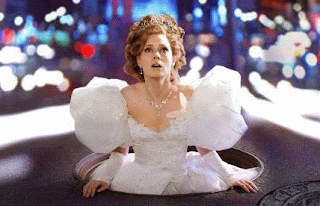
I really enjoyed our discussion on Friday about postmodern fairy tales, broken narratorial frames and manipulation of tropes like we saw in the Three Little Pigs re-telling. When it came time to blog I trolled around on the internet looking for other examples of postmodern fairy tales, and came across this very interesting article about the Disney movie Enchanted.
I like Amy Adams. She's super cute and has a great voice. But as a feminist, this movie kind of infuriated me. As Megan Griffith-Greene writes in her article "Puzzled by Enchanted," Disney presents the film as "a kind of post-modern fairy tale, inverting the stereotypes that Disney has helped construct about femininity," when in reality it's anything but.
As Griffith-Greene points out, Adams' character Giselle's waist is "the size of her neck, her eyes are wide and doe-like, and she's pluck and perky as she trills about dreams and true love and her perfect prince." This is just another case of bajillions in which the message to women seems to be, 'You're allowed to be different, even smart (gasp!), as long as you're still pretty and skinny and focus the majority of your attention on gettin' a man.' Giselle is also "hyper-domestic." And yes, she does save her (male) love interest from a dragon at the film's conclusion, but the movie still ends in traditional Disney-style heterosexual romance. And, Giselle replaces Patrick Dempsey's smart, working-woman girlfriend! AND Dempsey's daughter prefers Giselle to the women he tries to present to her as role models, from Rosa Parks to Marie Curie.
What all this made me realize is perhaps how difficult it is to escape the tropes of a narrative form you're trying to invert. The tropes of a princess story (true love, cleaning houses with animals, singing sweetly, and all that jazz) are rampant in a film whose stated goal (Disney is culpable of intentional fallacy, of course) is specifically to trump them!
I see what you mean, although I'm not sure that the intent of "Enchanted" is to invert the classic fairy tale tropes so much as to reflect upon them. Giselle starts out as very much the typical princess who just waits around for her prince and then immediately assumes that her life will be lovely and perfect. The movie really calls this out when, just after meeting Giselle, Prince Edward exclaims, "We will be married in the morning!"
ReplyDeleteI do agree that it's not a feminist's dream of a revamped fairy tale, but I think Giselle's better moment comes when she realizes that her notion of true love is very naive and asks Edward to go on a date with her so they can get to know each other better. Also, by the end of the movie she has her own business, which was a first for Disney at the time.
But I think you're right in that tropes are difficult to escape; you have to keep things familiar enough to be recognizable to your audience but also accomplish the new story.
For a much more successful feminist Disney movie, I recommend "The Princess and the Frog." :)
The Princess and the Frog is fantastic! I highly recommend it!
ReplyDeleteBlair, you bring up an interesting point about using tropes of a genre to make fun of that genre. I think this is particularly evident in the “That’s How You Know” song from Enchanted: http://www.youtube.com/watch?v=xRYU4cqUAUs.
Notice three things. First, the singing (and the random other people joining in the song) that seems to spring from conversation is one of the biggest Disney (and musical) tropes of all time. Second, the red-headed lead then spins her arms out in a large field while singing (Sound of Music, anyone?). Then, Giselle sings, “Everybody wants to live happily ever after,” and implies that, of course, the only way to show someone you love them is to take them dancing and sing and give flowers. So, lots of stereotypical Disney tropes at work, but I think what makes this particular scene funny is the presence of irony. This scene, unlike other Disney animated films, intentionally clashes “real” life and “fairy-tale.” Some frames are definitely shifting. Watching this scene without the first 30 seconds or so wouldn’t make the irony as effective: we need to know that the guy Giselle is with hates all things fairy-tale-ish, including singing and dancing. It also wouldn’t be as effective without prior knowledge of things like Snow White and Cinderella, where many of the tropes that belong in fairy tales come from. Our knowledge of Disney tropes, and our knowledge that this movie intentionally breaks the frame of completely realistic and completely fairy-tale for humor enables us to see the irony.